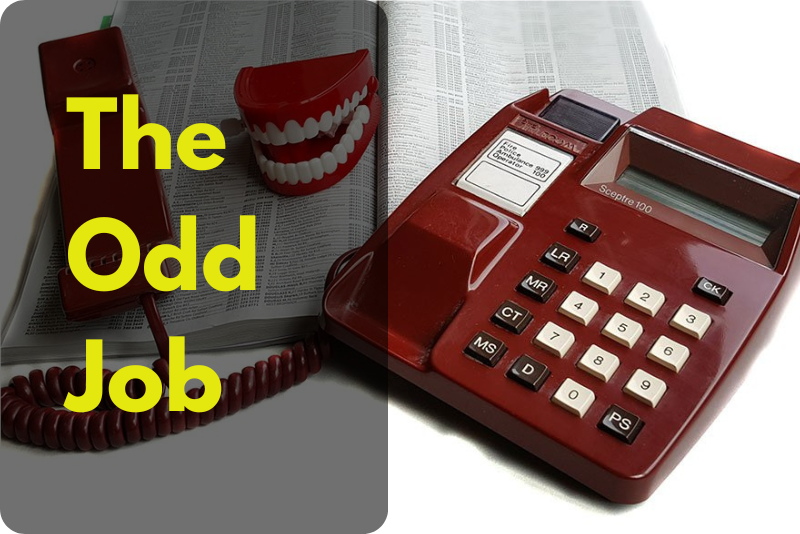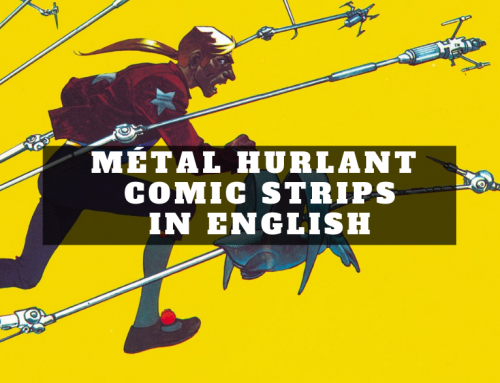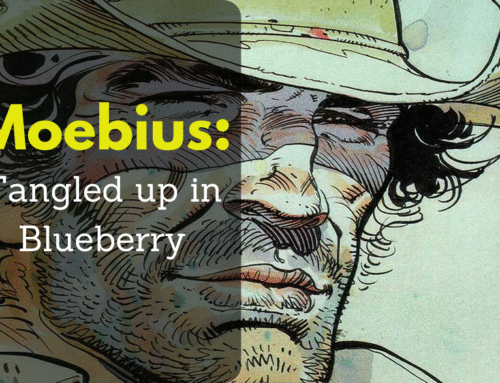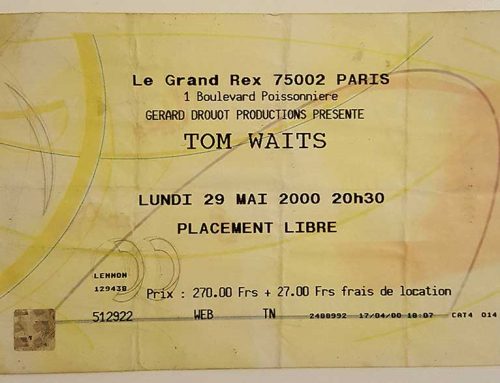Most of us have had a bad job at some point in our lives. Often we’ll just chalk it up to experience, but occasionally more drastic action is required. CVs may need to be sanitized and résumé entries redacted, taking care not to arouse the suspicions of future employers with tell-tale gaps in the timeline and an abundance of thick black horizontal lines. Sometimes, though, even this isn’t enough. Every once in a while a job comes along that is so bad, so weird, so wrong in every conceivable way that no amount of judicious pruning of the past can lessen its damage.
This is my bad, weird, and wrong in every conceivable way job story.
Just over a decade ago I got a call from my friend and former boss, Chris. We’d both recently been made redundant from a big financial services firm where we’d worked together for many years. He’d just got a job managing a sales team at a new publishing business and wanted me on board: ‘I know sales isn’t really your thing,’ he said, ‘but it’d be fun to work together again.’
He was right, but it’d be more than just fun: this would be like a dream come true. As a young graduate I’d sent my CV to dozens of publishing houses in London, but never managed to get so much as a toe in the door. Sure, working on a sales team wasn’t quite what I had in mind, but it was a start. ‘What sort of books do they publish?’ I asked.
‘Phone books,’ said Chris.
This wasn’t quite what I had in mind, either.

Image: © Billion Photos via Canva.com
Chris told me that a young entrepreneurial hotshot saw a gap in the market and was launching a brand new business-to-business telephone directory. ‘Really?’ I asked, genuinely intrigued. ‘With paper and pages and stuff?’ I didn’t want to question the business savvy of an entrepreneurial hotshot, but this seemed like a rather odd choice of venture to embark on during the first decade of the twenty-first century. More and more businesses were migrating online, and this was especially true of phone books: even a casual observer could see that the Yellow Pages was well on its way to becoming a Yellow Page.
Despite these misgivings, I still needed a job so accepted the offer. Chris asked if I could start a few days early to help set up our new office and I was happy to oblige. Up until then I’d only ever worked at big, established companies, so the idea of being present at the birth of a business kind of excited me. I even brought along some cigars.

Image: © miroslavmisiura from Getty Images via Canva.com
‘Good morning, Ed,’ said Chris to the new arrival. ‘I’ve just been introducing Tom to the team.’
Good God, I thought, my new boss is a child! Chris said he was young, but I wasn’t expecting this.
The young man grasped my hand and shook it firmly. ‘Welcome to the Business Book’, he said. ‘I’m the managing director, Edward Elgar.’
‘Elgar?’ I blurted out. ‘As in the composer?’
I froze. Oh no, I thought, I’ve done it again. Another terrible first impression. He must have heard that thousands of times. He’ll think I’m an idiot.
Edward, though, looked genuinely puzzled. ‘There’s a composer called Edward Elgar?’ he asked. ‘Wow – maybe that’s why people always say that my name sounds familiar.’
And I could tell he wasn’t being sarcastic.
This awkward meet and greet was mercifully interrupted by a commotion outside. ‘Edward!’ a woman’s voice bellowed. ‘Your father needs a hand out here with these boxes.’
Edward’s mum and dad were in the car park, unloading the boot of their vintage Bentley. His mother was a large woman in her late-fifties who wore a fashionable floral dress which clashed somewhat with the enormous silver crucifix hanging from her neck. The combined effect was like a strange mash-up of Hattie Jacques and Professor van Helsing. His father was much older than I’d have expected, and I found myself doing some quick mental parental arithmetic: based on his age, posture and clipped mannerisms I was able to deduce that he’d probably seen action during World War II, although the massive veteran’s badge on his blazer was another big clue.
So this is what a family business looks like, I thought.
After we carried the boxes into the office, Edward invited me to join him in the conference room so he could get my formal induction out of the way. He opened with a question: ‘Tom, how old do you think I am?’
It was an odd choice of ice-breaker, and I didn’t know what to say. I felt I was being manoeuvred into a trap. ‘Um,’ I said.
‘Seriously, how old do you think I am?’
‘Um.’
‘I bet you think I’m 17 or 18!’
Bloody Hell, I didn’t even think he was that old! ‘I don’t know,’ I said. ‘I’m not very good at guessing people’s ages.’
‘Come on,’ he said, giggling now. ‘Higher or lower than 20?’
What’s this, I thought, Bruce Forsyth’s Play Your Cards Right? He can’t be old enough to remember that!
‘Um,’ I said. ‘Higher… maybe?’
‘That’s right!’ he said, ‘I’m 21!’ Apparently, looking so young had been a bit of a professional hindrance for Edward. For one thing, he had to avoid business meetings in licensed premises in case he got ID’d. ‘That would compromise my credibility,’ he said in earnest.
I was never one to hang out with hotshot entrepreneur types (especially ones who looked like they should be choosing their GCSE options), but it soon became clear that they were the sort of people who really, really liked to talk about themselves. This came as a bit of a relief as it minimised my chances of blurting out another faux pas.
Edward had a background in recruitment, and was the founder of what he described as ‘the region’s leading senior management placement specialists’. His mum and dad (who he preferred to call ‘The Directors’) had recently moved into the area after spending several years overseas, and were temporarily living in his flat (sorry, ‘spacious executive apartment’). They were helping Edward set up his start-up, although this wasn’t his first foray into the murky world of business-to-business telephone directories. He’d recently tried to launch a similar publication to be managed by his ‘beautiful ex-model girlfriend’ (his phrase), but she broke his heart, organised a staff mutiny, and set up a rival telephone directory business like some kind of heartless phone fatale.
By the end of the induction session I learned a lot about my new boss, but had no idea on where to find the nearest fire exit.

Background image: © fbilhalva from pixabay via Canva.com
I didn’t see that coming, appropriately enough.
What could I say? Should I fess up and tell the truth, admit that I’m just a lapsed Irish Catholic struggling to find the right kind of parking spot along the agnostic highway? On second thoughts, I’d just got a new job, this was the mother of my new boss, and she’s wearing an immense silver crucifix. I decided to play it safe.
‘Yes,’ I said, ‘I believe in the Holy Spirit’.
‘I’m glad to hear that,’ she said, quite matter-of-factly. ‘You see, my intuition tells me that you’re not a natural salesperson.’
I was taken aback, and a little offended. My job didn’t officially start until the following Monday. You’d think my new employers would be grateful I arrived a few days early to help set the place up instead of prejudging my sales potential. They’d not even given me the chance to show them how crap I was.
And that’s when the conversation took yet another unexpected turn. Hattie’s features softened and she smiled: ‘I get messages from the Holy Spirit, Tom, and the Holy Spirit tells me that you’ll make a perfect Editorial and Research Manager.’
I didn’t see that coming, either.
I spent the rest of the day trying to process my Immaculate Promotion. After years of climbing the greasy pole the old-fashioned way, in the end all it took was a good reference from Heavenly HR. That sort of thing’s only supposed to happen to people like Moses.
It’s fair to say that Hattie and Edward were, to put it mildly, a tad eccentric. She was willing to promote a complete stranger based on voices in her head, while he displayed a penchant for self-aggrandisement that would make a contestant on The Apprentice blush. I still held out hope for The Major, though. He was a veteran of WW2, and I’ve always felt an innate sense of respect towards members of The Greatest Generation. One day, the radio was on in the office and there was a news report about some natural disaster. The Major said grumpily: ‘This wouldn’t have happened if Hitler won the war.’
Oh God, I thought, not him as well.
As a newly-minted manager I got to sit in on management meetings, and it soon became clear that Edward and his parents – sorry, The Directors – hadn’t really thought this whole thing through. During the first meeting we reviewed a mock-up of the cover, which featured a nice big photograph of the Rotunda. The plan was to launch a Midlands edition before gradually expanding nationwide, which seemed fairly sensible to me until I asked the Elgar clan to clarify what they meant by ‘the Midlands’. What they meant was absolutely everything in England between Yorkshire and the M25. ‘In that case,’ I said, trying to be helpful, ‘maybe having The Rotunda on the front cover isn’t such a good idea. That’d be a tough sell in the Home Counties’.

Image: © miroslavmisiura from Getty Images via Canva.com
I was beginning to have serious doubts as to whether Edward was quite as business savvy as he repeatedly made himself out to be. One day he was getting ready for an appointment with his bank manager to discuss a loan for the company, and – just to make conversation – I casually reminded him to remember to bring his business plan.
‘Do you think I’ll need my business plan?’ he said, looking panicked.
‘Yes, Edward,’ I replied. ‘I think you’ll need your business plan.’
‘Could you make me one? I’ll need it in ten minutes’
At some stage we were going to have to pay to get these phone books printed. Edward said that the printing costs would come out of the profits raised from selling advertising space up front, but unfortunately he hadn’t gotten around to budgeting for this. Chris and I made some phone calls, got some quotes and ran them past Edward. He went pale, locked himself in the conference room and screamed. When he eventually calmed down, he called an emergency staff meeting and announced our new strategy: ‘We’ll only be printing copies for people who have bought advertising space.’
To put it another way, he’d just invented the world’s first vanity phone book.
Money was becoming a big problem. The sales team were doing their best, but potential customers were understandably reluctant to commit their advertising spend on a phone book that didn’t exist. Edward’s solution? He wrote a cold-calling script that described our product as ‘the UK’s number one business directory.’
Chris was furious: ‘You can’t say that something’s number one when it doesn’t exist yet!’
‘Yes we can!’ said Edward, defiantly. He jabbed his forefinger repeatedly against the side of his head. ‘In my mind we are number one.’
This wasn’t very reassuring.
Weeks went by, and a continued lack of advertising revenue suggested that businesses located between Yorkshire and the M25 were unimpressed with Edward’s powers of positive thinking. Almost every day he’d come up with a new hare-brained scheme to supercharge the business, and almost every day Chris and I would make some phone calls and tell Edward how much that idea would cost to implement. Edward would go pale, lock himself in the conference room and scream.
His behaviour became increasingly erratic. He was no stranger to gilding the lily, but now his tales of self-aggrandizement were becoming increasingly preposterous. He’d frequently boast about having a black belt in karate, and that when he left his home town his sensei wept ‘for he had nothing more to teach me’. He’d reminisce about a part-time job he’d had as a teenager at ‘the UK’s number one sports retail chain’ (not just at any old branch, of course, but ‘their flagship store’), where he swiftly rose to the rank of assistant manager despite only working on Saturdays. One day, his boss was being threatened by an angry customer who was presumably unhappy with the cut of his gym sock.
‘Let me deal with this,’ said Edward.
‘No, Edward, don’t!’ his boss pleaded. ‘The deputy manager of a flagship store can’t get into a fight with a customer – it’s against company policy!’
‘Then I resign!’ he declared, before incapacitating the assailant with a traditional roundhouse kick.
One Monday morning Edward made an announcement. He told us that he’d had a meeting with The Directors over the weekend (translation: he was having dinner at home with his mum and dad) and they’d unanimously decided that publishing a printed directory was no longer viable. Instead, they would launch an internet search engine.
‘That should keep the printing costs down,’ said the Major, unhelpfully.
‘What’s our target market?’ I asked. I was no entrepreneurial hotshot, but it seemed like a reasonable question.
‘What do you mean?’ asked Edward.
I was beginning to lose my patience. ‘Edward, if you’re going to set up a search engine, then we’ve presumably got to do something the other very successful search engines don’t already do. So what’s going to makes us different? Who are we aiming this at?’
‘It’s for everybody!’ cried Edward, enthusiastically.
‘You mean like Google?’
‘Yes!’ he said, emphatically. ‘But better than Google!’
Gregg, a lovely chap who was our entire IT department, stepped up to the plate: ‘Edward, are you serious?’
‘Yes I am!’ growled Edward, angrily. He jabbed his forefinger repeatedly against the side of his head and cried: ‘In my mind we’re better than Google!’
In the weeks that followed, it soon became apparent that a young entrepreneur, his parental directorate and their small but increasingly-bewildered workforce were no match for Silicon Valley’s finest. Edward was telling the sales team to promote our site as ‘the UK’s number one search engine’ – which, of course, could immediately be disproven by Googling us.
Every day the bank would phone wanting to speak to Edward, who would invariably gesticulate wildly while silently mouthing the words ‘I’m not in!’ This, I’ve subsequently learned, is never a good sign.

Background image: © Toa55 from Getty Images via Canva.com
Edward’s head popped up from behind his monitor. The very next day he called an emergency staff meeting and announced our new strategy: we were abandoning the search engine business and becoming a locksmiths’ college.
Edward said he’d been networking with someone close to then Chancellor of the Exchequer, Gordon Brown, who ‘could pretty much guarantee us’ unlimited government funding for teaching people how to make keys and fix locks and stuff. Unsurprisingly, this didn’t go down too well amongst his employees. As the only person in the room who’d been promoted by the Holy Spirit, I felt a moral duty to take a stand: ‘Edward, this is insane! How in the name of Harry Bastard Houdini are we going to train locksmiths?’
Edward started raising his forefinger to the side of his head, but his mother interrupted. ‘I’ll deal with this, Edward.’ She scowled at me, and – in the most patronising voice I’ll probably ever hear – said: ‘It’s quite obvious: all we need are some premises, a few tools, and a piece of wood, roughly door-shaped.’
And that was it. Not a door, but something ‘roughly door shaped’. Presumably she had in mind some piece of wood that starts off, say, baby grand piano-shaped before seamlessly transitioning into something a bit more recognisably door.
Unsurprisingly, the company folded soon after this, with Edward owing us salary that never got paid. Still, this narcissistic blowhard with his Walter Mitty complex had one last deranged scheme up his sleeve. On what turned out to be our last day in the office, he took Chris, me and a couple of other male colleagues to one side and pitched us the opportunity to invest in a new website he was going to launch. This time it wasn’t a Google-killing search engine, but something a bit more saucy.
‘But please,’ he whispered. ‘Don’t tell The Directors.’
I’ve tried to recreate these events and conversations based on my memories of them. Names and identifying details have been changed to protect the privacy of individuals, and because I don’t want to hear from these mad bastards ever again.
This originally appeared in Scylla Magazine.
Ad: Workplace Comedy at Amazon
[amazon box=”B09P5WN394,B0000BZNIU,B01LZSEFGR”]













